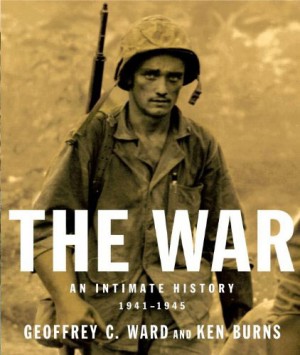23 Jan The War
A few weeks ago I went to the library and checked out the audio book The War by Geoffrey C. Ward and Ken Burns. I was going to drive to Columbia SC to visit with our Dad, Herman, for New Year’s and this would give me something to listen to during the 4-hour drive. There are 8 CD’s, 9 hours of listening.
I figured I would just jump ahead to the sections about the bomber boys flying out of England. Instead I listened mesmerized, beginning at the bombing of Pearl Harbor, through the war in the Pacific … the Philippines, the Bataan Death March … Normandy … Italy … Now I’m listening to them move through Germany. I’m driving to Columbia again tomorrow so I can finish the series and then start over.
Here’s what I kept thinking … how did they accomplish all this without cell phones, email or GPS? I asked one of my Veteran friends this same question and his answer was, “we had spies everywhere.” How could our country afford this war? Our entire nation was involved, connected, committed, sacrificing, rationing. It was very different then wasn’t it?
Herman Allen wrote poetry all his life. During the war, he wrote about patriotism, liberty, death. One of the first poems he wrote during this time was about Bataan. He had enlisted in the Army Air Corps only a couple of months before … I thought about this poem as I listened to the agonizing account of what happened there.
THE HEROES OF BATAAN
They carved their names
Deep in the granite of Time,
Those men
Who gave their all,
Their hopes, their life,
So that we
May enjoy the freedom
That liberty brings,
Which is the heritage
Of every man
Irregardless of his race,
Or creed,
Or color.
Their star will never dim
In the annuls of history
Yet to unfold;
Their glory never fade
In the memory of those
Who have yet to know
The scent of life,
Who have yet to know
The cause for which they
So valiantly died.
Ay, their task is done,
The life they loved is over,
But who amongst us all
Can say
They died in vain …
Who amongst us all
Can say
There is no hope …
These heroes of Bataan,
These men have shown
That as long
As there is a star to shine,
Granite to be carved,
Liberty and freedom
Will survive.
The War: An Intimate History, 1941-1945 on amazon.com
Related post: The War documentary



Johnny
Posted at 10:28h, 24 Januaryhey – I didn’t know what the Bataan Death March was all about so I looked it up on Wikipedia:
“The Bataan Death March took place in the Philippines in 1942 and was later accounted as a Japanese war crime. The 60-mile (97 km) march occurred after the three-month Battle of Bataan, part of the Battle of the Philippines (1941–42), during World War II… The march, involving the forcible transfer of 76,000 American and Filipino prisoners of war captured by the Japanese in the Philippines from the Bataan peninsula to prison camps, was characterized by wide-ranging physical abuse and murder, and resulted in very high fatalities inflicted upon the prisoners and civilians along the route by the armed forces of the Empire of Japan. Beheadings, cut throats and casual shootings were the more common and merciful actions — compared to bayonet stabbings, rapes, disembowelments, numerous rifle butt beatings and a deliberate refusal to allow the prisoners food or water while keeping them continually marching for nearly a week (for the slowest survivors) in tropical heat. Falling down, unable to continue moving was tantamount to a death sentence, as was any degree of protest or expression of displeasure.”
Bobby Lee Silliman
Posted at 22:40h, 25 MarchHaving grown up in Carlsbad , New Mexico, the mention of Battan evokes immediate attention as many men from Carlsbad were among the thousands of men who were captured by the Japanese and had to endure or die during the Battan Death March. An entire national guard unit from Carlsbad was over-run and taken prisoners in 1942. Many men from this National Guard Unit did not survive the Death March…… some did.
I can see why Herman F. Allen would choose to write a poem about this dark side of human nature but more importantly….. write into his poem the uplifting words of encouragement.
Thank you for allowing us to read his words.
Bobby Lee Silliman